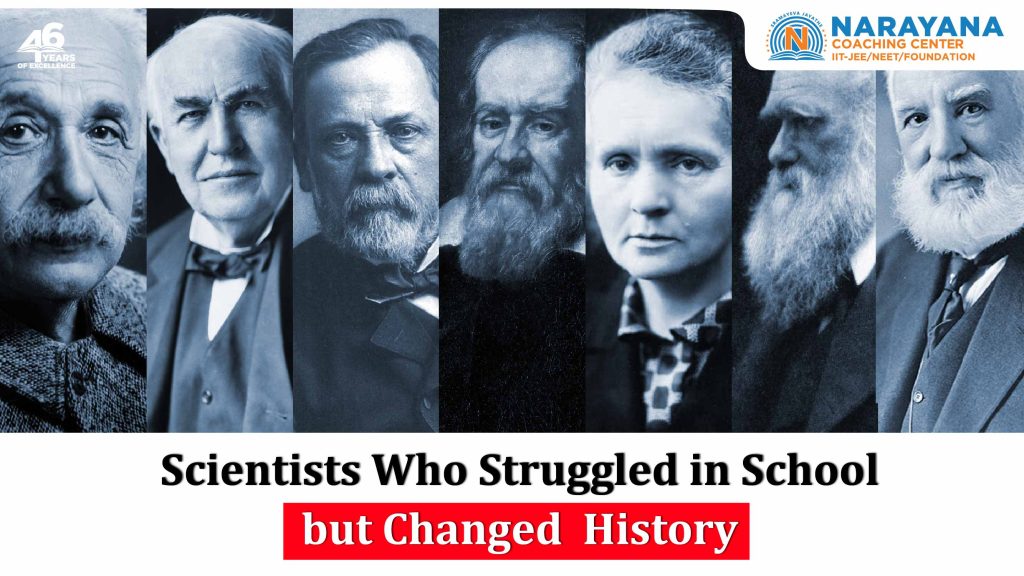
Failure in school doesn’t always signal failure in life. In fact, some of the world’s most renowned scientists started their journeys being labeled as slow learners or academic misfits. Despite their rocky beginnings, these individuals transformed our understanding of the world. Their stories remind us that perseverance, curiosity, and unconventional thinking often matter more than grades.
Albert Einstein: The Daydreaming Genius
Albert Einstein, one of the most iconic physicists in history, struggled with speech delays and was thought to be intellectually challenged as a child. Teachers labeled him as lazy and inattentive because he often daydreamed during class.
Despite these setbacks, Einstein developed the theory of relativity, reshaping physics forever. His imagination and ability to think abstractly proved far more important than his early academic performance. Einstein later said, “Imagination is more important than knowledge.”
Thomas Edison: Expelled for Being “Slow”
Thomas Edison, the inventor of the electric light bulb and phonograph, was expelled from school at the age of 12. His teachers believed he was too slow to learn and a poor student. Fortunately, his mother decided to homeschool him, fostering his love for experimentation.
Edison’s relentless tinkering led to over 1,000 patents. His success was built not on formal education but on hands-on learning and an unbreakable work ethic.
Michael Faraday: Poor and Uneducated, Yet Brilliant
Michael Faraday, a pioneer in electromagnetism and electrochemistry, came from a poor family and received only basic education. He began his career as a bookbinder’s apprentice, where he self-educated by reading the books he bound.
Faraday’s passion and self-discipline earned him a spot assisting renowned scientist Humphry Davy. He went on to make discoveries that became the foundation of modern electromagnetic technology, including electric motors and generators.
Charles Darwin: Labeled as a Failure
Charles Darwin, known for his theory of evolution, performed poorly in school and was considered a failure by his teachers and father. He was more interested in collecting beetles than studying Latin or Greek.
Darwin’s curiosity about the natural world led him to a voyage on the HMS Beagle, where he gathered data that changed biology forever. His perseverance and love for observation outshone traditional academic metrics.
Galileo Galilei: At Odds with Authority
Galileo, often referred to as the “father of modern science,” struggled to fit into the rigid education systems of his time. He frequently clashed with professors and left university without a degree.
Despite this, Galileo made revolutionary contributions to astronomy, physics, and scientific methodology. He discovered Jupiter’s moons and supported heliocentrism, challenging both scientific and religious authorities.
Benjamin Franklin: A Dropout Who Illuminated the World
Benjamin Franklin had only two years of formal schooling. He was largely self-taught through voracious reading and experimentation.
Franklin’s curiosity led to groundbreaking discoveries in electricity, including the concept of positive and negative charges. Beyond science, he was also a statesman, inventor, and philosopher—truly a polymath shaped outside traditional education.
Louis Pasteur: Mediocre Student, Scientific Visionary
Louis Pasteur, the man behind pasteurization and vaccination, was an average student who failed his early entrance exams in science. He showed little academic promise in his youth.
However, he found his passion in chemistry and became one of the most influential scientists in medical history, saving millions of lives through his discoveries.
Thomas Hunt Morgan: From Struggling Student to Genetics Pioneer
Thomas Hunt Morgan initially struggled in school, especially in his early university years. His academic record was unspectacular, and his teachers questioned his scientific abilities.
Nevertheless, Morgan became a Nobel laureate for his work in genetics, proving that genes are located on chromosomes. His fruit fly experiments laid the groundwork for modern genetics.
What Their Stories Teach Us
These scientists prove that academic struggles do not define intellectual potential. Their lives underscore several key lessons:
- Failure is not final. Early setbacks can be the foundation of resilience.
- Curiosity fuels success. Genuine interest often surpasses traditional learning methods.
- Self-learning is powerful. Many of these figures were autodidacts who taught themselves from books and experiences.
- Nonlinear paths lead to greatness. Not all roads to success go through elite schools or high grades.
Conclusion
The journeys of these scientists remind us that greatness isn’t reserved for straight-A students. Passion, persistence, and an inquisitive mind can overcome almost any educational obstacle. Whether you’re a student struggling with grades or an adult questioning your path, their stories inspire us to keep pushing forward—and think beyond the classroom.
FAQs
- Can someone be successful in science without excelling in school?
Absolutely. As these scientists show, a passion for discovery and perseverance can lead to groundbreaking work, even without top grades. - Why did Einstein struggle in school?
Einstein had a unique way of thinking and learning that didn’t fit the traditional classroom model, leading teachers to misjudge his potential. - How did Michael Faraday become a scientist with no formal education?
Faraday was self-taught and gained opportunities through mentorship and apprenticeships, which allowed him to develop his skills and knowledge. - Were these scientists failures early in life?
Many were considered failures academically, but their later achievements proved otherwise. - What can students learn from these stories?
Students can learn that success isn’t determined by early academic performance but by passion, resilience, and a willingness to keep learning.
